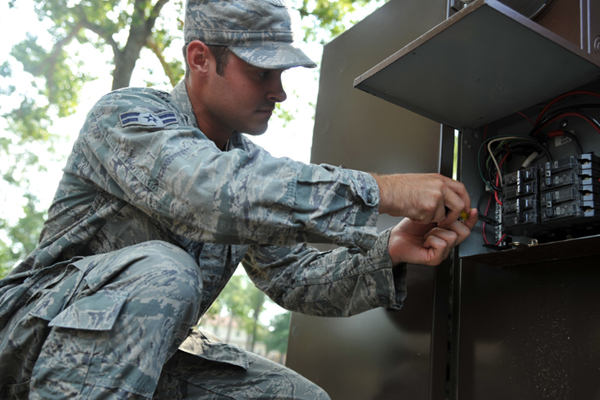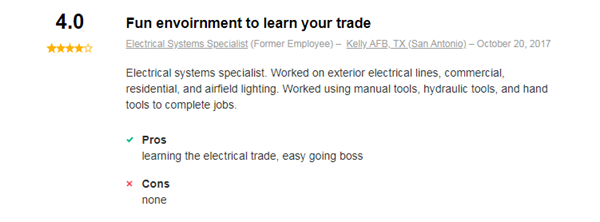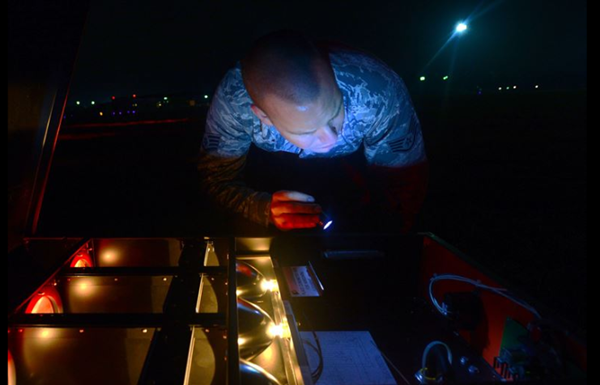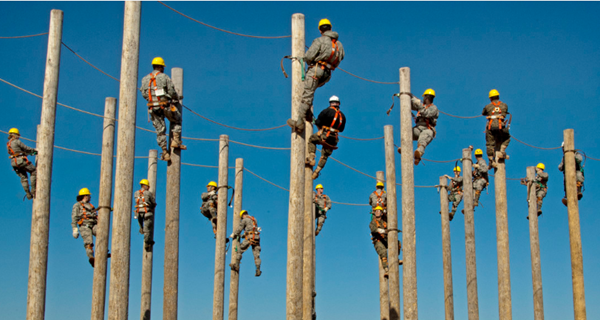Air Force Electrical Systems (3E0X1) specialists are responsible for installing, modifying, repairing, and maintaining vast electrical networks.
These individuals can work on everything from fixing a light in the courtyard to space command communication and alarm systems.
They are the troubleshooting experts who ensure every Air Force function is operational and dependable.
Jump To A Section
Education, Qualifications, and Training
This is an entry-level position that requires additional knowledge and testing requirements.
Education
To enter into this position recruits must have a High School Diploma or GED.
Recruits must also take and pass both the Mechanical and Electronics ASVAB requirements.
You’ll need a score of 35 or better on the Electronics portion, and a 35 or better on the Mechanical portion of the test.
Qualifications
Electrical Systems specialists are required to have knowledge relating to the principles of electricity and electronics.
Individuals must have a valid state driver’s license in order to operate government motor vehicles.
You cannot have a fear of heights or be color blind to hold this position.
Individuals have to be at least 17 with parental consent and 16 without.
They cannot be older than 39 years old.
Related Article – Air Force Age Limit
Training
After passing all qualifications and tests, the airman will attend Basic Military Training for 8.5 weeks.
When Basic Training is complete, recruits will go to Sheppard Air Force Base in Texas for 99 days to complete Technical Training.
Upon completion of Basic Training, Technical Training, and any skill requirements, recruits will reach the apprentice level and have earned credits towards Electronic Systems Technology.
What Job Tasks does an Electrical Systems Specialist Have?

Electrical systems specialist will perform a variety of tasks based on their specific job title.
Possible job titles in this field include Interior Electrician, Exterior Electrician, Lineman, Airfield Electrician, General Electrician, Airfield Lighting, Alarms, Guard General Systems, and more.
All of the job titles vary based on the exact duties, but all functions of the above jobs surround establishing and maintaining different types of electrical systems.
Electrical System specialists complete tasks that could have them in any location on the base.
Related Article – Marine Corps Electrician (MOS 1141): Career Details
These specialist are in charge of removing and installing:
- Outdoor and Interior light fixtures/control and related components
- Ground Fault Current Interrupter devices
- Nonmetallic rigid conduits
- Receptacles
- Junctions
- Switches
- Switch boxes other than explosion-proof
They also measure, cut, bend, fit or attach electrical conduits, rigid conduits, and pipes.
Specialists rewire lighting fixtures, wires, cables, and complete overall electrical control troubleshooting.
They will bench check, service, and repair lighting fixtures.
Electrical Systems specialists are in charge of emergency and airfield lighting.
They can replace the poles, underground cables, and motors or starters.
Firing and maintaining weapons and maintaining mobility kits can be part of the Electrical System specialist’s job.
Most practice CPR and first-aid responsibilities in addition to their regular duties.
All will follow and perform equipment lock-out and tag-out procedures to ensure the safety of themselves and others.
Any work that needs to be performed will be surveyed to gain an understanding of resource requirements.
Interior Electricians generally focus on lighting, conduits, motors, starters, and mobility preparation.
Exterior Electricians generally focus on high-voltage areas.
Their work can include airfield lighting, including installation of poles and stringing overhead conductors, underground systems and alarms, among many other tasks.
Individuals who are in the Lineman job focus on overhead systems such as pole installation.
Related Article – Air Force Personnel (3F0X1): Career Details
Working with alarms is a specific category among Electrical Systems specialist.
This job function can include installing and maintaining alarm systems and system components.
Job tasks surrounding alarm systems include removing or installing fire alarms, intrusion alarms, batteries, and annunciator panels.
Alarm system tasks can also include inspecting and cleaning the above systems and components.
Another job, Guard General Systems, under the electrical systems category, perform duties that are related to overhead and low-voltage distribution systems.
These specialist job functions can include routing wires, analyzing drawings, performing operator maintenance on line maintenance trucks, reading service meters, drill structures and solder electrical connections.
Individuals in the above job titles as well as other job titles in the Electrical Systems job, all perform slightly different variations of work and range in rank and time of service.
Once individuals are in the Manager or Superintendent stage, they are higher in rank and their job duties change.
In addition to completing some maintenance activities, individuals at the Manager and Superintendent stage will complete work aimed at counseling and supervising subordinates.
They will create work assignments and determine training requirements.
These specialists also interpret policies and conduct training.
Depending on the job that they perform, Electrical Systems specialists could complete over 175 different tasks.
This requires an individual to be diverse and gain a general knowledge of several different systems during training.
Related Article – Air Force Aviation Resource Management (1C0X2): Career Profile
What Does an Air Force Electrical Systems specialist get Paid?
All Airmen receive the same base pay depending on rank and time of service.
The individual job descriptions referred to above will not have a reflection on the pay you receive, only the tasks you perform.
Most entry-level recruits can expect to start out on the lower end of the pay scale.
There are many ways to increase your rank and pay.
Read the article here for more information.
Benefits
In addition to base pay and other pay opportunities, airmen receive benefits at little to no cost.
Airmen are entitled to insurance that depending on your family status and location, will include medical and dental for free or low cost compared to a civilian plan.
They will also receive both a housing and food allowance based on family status, location, and rank.
Paid sick time, vacation, zero-cost retirement plan, recreational access, and education tuition are also included in the Air Force benefits.
For more information on benefits click here.
Related Article – Navy Electricians Mate (EM): Career Details
Job Reviews
According to a survey completed by the Air Force on Electrical Systems specialists, people in this position seem to have more positive job satisfaction than individuals in other positions, (survey link in the references section below).
This is a position that allows for growth and increased knowledge and responsibility.
Individuals in this position generally find a home/work-life balance that works well for them.
The hours can be long but are often standard when not deployed.
A few reviews from previous Electrical Systems specialists can be found below.


Related Article – Military Child Care: 8 Great Options
Civilian Career Opportunities
Working in Electrical Systems in the Air Force opens the door for a career as an electrician as a civilian.
Experience gained in this position will relate to a variety of career fields.
Related job titles include:
- Electrical Systems Control Tech
- Electrical Test Technician
- Electronics Technician
- Site Technician
- Instrumentation and Electrical
- Power Supply
Jobs are generally readily available in this career field and usually do not require you to move locations to find work.
The pay for this field can vary drastically.
Most entry-level positions currently posted will start around $20 an hour, but with the experience and knowledge gained as an Electrical Systems specialist in the Air Force, you can usually expect to start a lot higher than that.
Related Article – US Air Force Engineering (3E5X1): Career Details
Summary

Air Force Electrical Systems (3E0X1) specialists ensure that all electrical components are in working order.
These specialists are required to install, inspect, repair, and maintain a large variety of electrical components.
They are required to be knowledgeable and efficient to ensure systems are in working order.
This position requires knowledge of electricity and electronics, as well as additional ASVAB testing compared to other positions.
The job outlook on this career path is great, and reviews from previous employees are very positive.
After working in this career path, the airman will have extensive knowledge of electrical systems that will allow for a career as an electrician in the civilian world.
References:
Air Force 3E0X1 Occupational Survey Report
Air Force Electrical Systems Career Details
- Ikon Pass Military Discount: Learn How To Save Big - January 31, 2025
- RTIC Military Discount: Find Out How To Save Big on Gear - January 30, 2025
- Traeger Military Discount: Learn How To Save Big on Smokers - January 28, 2025




